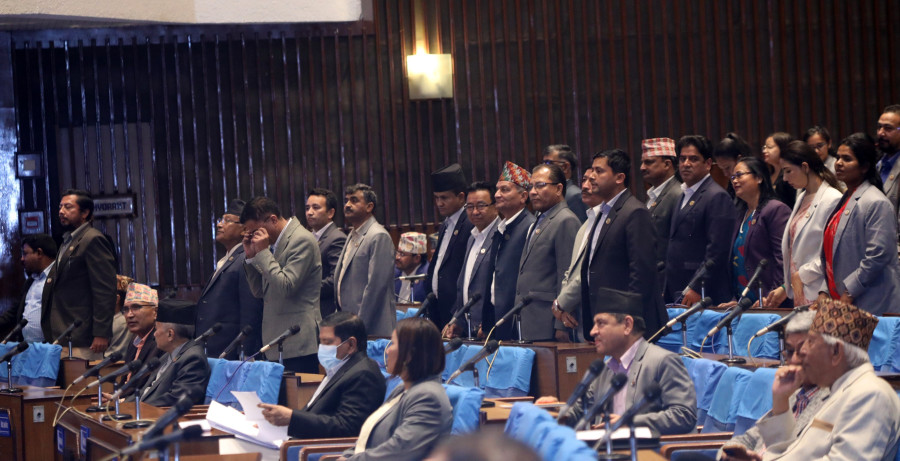Columns
Parliamentarism in the swamps
A handful of top leaders of major parties decide every national issue in closed-door meetings.
Achyut Wagle
Over the last month, scheduled meetings of the House of Representatives were obstructed for the 10th time by the main opposition party, Communist Party of Nepal (UML). The latest pretext for the stoppage is a demand to constitute a judicial inquiry committee to investigate how 100 kg of contraband gold slipped through customs at Tribhuvan International Airport, Kathmandu. Repeated disruptions to parliamentary business and proceedings have raised questions about the rationale and efficacy of the parliamentary system the country has adopted.
There have been around a dozen and a half disruptions in the House by this or that political party since the first session of the newly elected Parliament on January 9, 2023. The upper house, considered to be a chamber of the elite, is no exception when it comes to rowdy behaviour of the members. As publicly acknowledged by House Speaker Devraj Ghimire, such unparliamentary behaviour by the parties has hampered deliberations on several bills that urgently need to be legislated.
Chronic aberration
Due to similar obstacles and repeated dissolution and restoration dramas largely incompatible with established parliamentary practices, the lawmaking functions of the previous House, too, were severely hindered. No major party has let go of the opportunity to obstruct House business under every petty excuse. However, it has mainly been the communist and regressionary outfits who appear more aggressive than other parties in pressing their point home through muscle power instead of meaningful deliberations.
One of the main reasons why Nepal has remained underdeveloped and politically soft despite three decades of experimentation with multi-party democracy is the inability of the political players to respect parliamentarianism. An unequivocal duty of Parliament is to formulate forward-looking laws to enable the state to govern the country. This is exactly where our Parliament has comprehensively failed. It appears as if Parliament has been doing everything else except delivering timely legislation through informed deliberations.
There are at least 50 critical bills related to financial, educational, service delivery money laundering, use of electronic data and general governance that have been in limbo for years. And the country awaits a similar number of new laws in the face of emerging and futuristic issues encompassing e-governance, cyber security, fintech, environmental sustainability, industrialisation, urbanisation, land management, big data, and cyber crime.
The House is where the bills should be discussed and the differences resolved through a democratic process. All Members of Parliament should represent the issues of their electorates and enjoy absolute liberty to express their views on any important issue.
Throughout parliamentary history, there have been serious aberrations in these expectations and outcomes. The representation issue was thwarted right after the election to the first Parliament in 1992, two years after multiparty democracy was restored in Nepal. The House was made bicameral like it is today. The objective behind creating the upper house was to compensate for possible shortfalls in representation in the first-past-the-post electoral system.
The current constitution and the three that preceded it are clear on awarding National Assembly membership to personalities “significantly contributing in different walks of national life”. But this spirit has never been upheld. Henchmen of the top leaders, politicians rejected by the voters and those able to “purchase” seats in the upper house have invariably snatched the opportunity. Even the awarding of party tickets to contest the elections was not based on any transparent system. Consequently, this allowed more sycophants of influential leaders than intellectuals and thought leaders to become parliamentarians.
These Members of Parliament barely possessed their own independent voice and guts to speak their minds. Sadly, only a few elected representatives seemed to understand their expected role. Parties never bothered to train their members to become effective parliamentarians. In fact, this has happened not by default but by design.
A handful of the top leaders of major parties, who enforce almost dictatorial control in their respective organisations, decide every national issue in closed-door meetings; and the Members of Parliament are forced to follow the diktats on how to act or vote, based on the decisions taken by their bosses. Therefore, the parliamentarians are relegated to being mere numbers to be counted during critical voting in Parliament.
Marxist hangover
For parliamentarism to flourish, what is required is the unflinching belief of the political actors that parliamentary democracy is an end in itself, and not a means to something arcane. The crux of Nepal’s political problem lies here. The incumbent federal Parliament is dominated by Marxists. At least 55 percent of the 275 members in the House of Representatives are sworn Marxists. More than 75 percent of the 59 members of the National Assembly are left-oriented.
German philosopher and political theorist Friedrich Engels in his seminal work to elucidate Marxist political economy blamed the “swamp of parliamentarianism” (in late 19th-century Germany) as a key impediment to “scientific socialism”. Ideologically, the scientific socialism viewed through the lens of classical Marxism and Westminster-style parliamentary democracy are two opposite poles in terms of delivering the political dispensations. But Nepal’s parliamentarism in practice for the last three decades has been trying to co-opt Marxism (and Maoism) but with very limited success.
The communist forces of Nepal seem uncomfortable with completely shedding the “swamp” dogma and coming to terms with the inevitability of parliamentary democracy in the contemporary global context. The obstructions and acts of wrenching key laws out of the normal parliamentary route perhaps come from the Marxist and regressive orientations of the parties and their members. As a result, in stark contrast to Engels’ hypothesis, Nepal’s parliamentary system is in the swamps of Marxist ideological hallucinations, and democracy stands far from much desired institutionalisation.




 13.12°C Kathmandu
13.12°C Kathmandu















